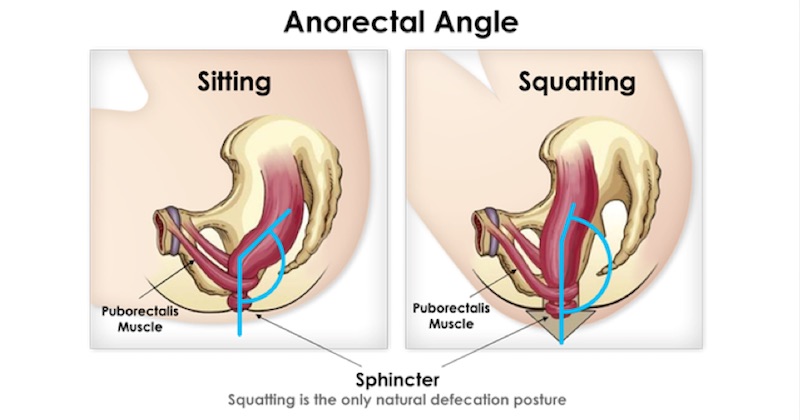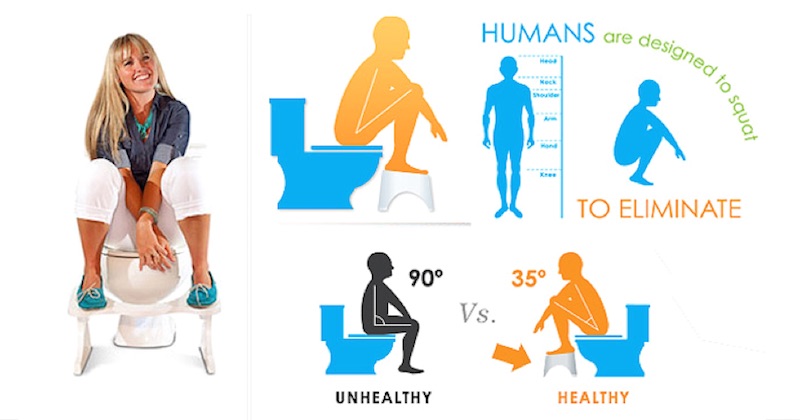Straining On The "Throne" Every Morning? You Have Been Pooping Wrong!
Last updated on
Bowel movements are probably low on most people’s list of topics they like to discuss, but it’s an important one nonetheless. Not only can your poop tell you a lot about your health, how you go can have a significant impact too.
Your pooping position can affect the ease with which you eliminate, and doing it wrong may increase your risk of bowel and pelvic problems, including constipation, hemorrhoids, and more. As it turns out, virtually everyone living in Western societies is doing it wrong!
Most of you reading this probably sit to evacuate your bowel, but this requires you to strain, which has some unwanted biological effects, including a temporary disruption in cardiac flow. Your body is actually designed to eliminate by squatting, which is the topic of the featured article in The Guardian.
Benefits Of Squat-Pooping
Sitting on a modern toilet places your knees at a 90-degree angle to your abdomen, which actually hinders elimination by pinching off your anal canal, as illustrated in the image below.

Importantly, this prevents fecal stagnation and the accumulation of toxins in your intestinal tract that can fester and contribute to bowel problems and a variety of discomforts.
In fact, non-Westernized societies, in which people squat rather than sit, do not have the high prevalence of bowel disease seen in developed nations; in some cultures with traditional lifestyles, these diseases are virtually unknown.
Devices That Enable You to Squat Easier
As the benefits of squatting have become better known, a number of devices have emerged, designed to help you assume the proper position.
One simple device is a foot stool that allows you to get into a more natural squat position without renovating your entire bathroom and converting to a hole in the ground, which is what you’ll find in some non-Western countries.
Many have reported that this squatting position with the aid of a stool makes elimination faster, more comfortable, more complete and reduces straining. Squatting rather than sitting, helps prevent straining, hemorrhoids, colon cancer, appendicitis, IBS, IBD, hernias, diverticulosis, pelvic organ prolapse, and even heart attacks—caused by the disruption of blood flow and straining.
With this method of pooping, most people find that elimination takes less than half the time what it used to be without a Squatty Potty.
If you have trouble with bowel movements, I highly recommend giving the squat position a try.
You can BUY SQUATTY POTTY here.
It’s an inexpensive way to improve your potty posture, and since you’re still sitting on your toilet, virtually anyone can benefit from it. Squatting without support can be a challenge for most who didn’t grow up squatting on a daily basis. It’s definitely a workout for your thighs!
You can BUY SQUATTY POTTY here.
The Importance of Regularity
Staying “regular” is important for optimal health, as it not only removes waste from your body; it also affects how you feel. Whether your bowel movements come too frequently or not often enough, it can make you uncomfortable, bloated, or even interfere with your body’s ability to absorb nutrients from your diet.
That said, what’s normal for one may not be normal for another. When we talk about regularity, what we’re really talking about is what’s regular for you. Anything from three bowel movements per day to three per week is considered to be within the normal range, with many agreeing that once a day is ideal.
More important than frequency is the ease with which you move your bowels. Moving your bowels should take no more effort than urinating or passing gas. If you have to push or strain, it’s an indication that something’s off. A sudden change in your bowel habits (for the worse) might signal a problem.
Factors that can affect regularity include your diet, travel, medications, hormonal fluctuations, sleep patterns, exercise, illness, surgery, childbirth, and stress, just to name a few.
Original article was first published in DrMercola.com. Republished here with permission.
Some of the links I post on this site are affiliate links. If you go through them to make a purchase, I will earn a small commission (at no additional cost to you). However, note that I’m recommending these products because of their quality and that I have good experience using them, not because of the commission to be made.

































 JOIN OVER
JOIN OVER
Comments